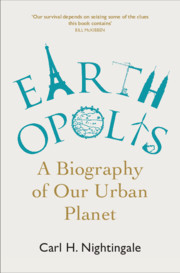Book contents
- Earthopolis
- Earthopolis
- Copyright page
- Dedication
- Contents
- Figures
- Maps
- Introduction Our Urban Planet in Space and Time
- Prologue Before and Beyond: Big Things in Tiny Places
- Part One Cities of the Rivers
- Chapter 1 Making Politics from Sunshine, Earth, and Water
- Chapter 2 Igniting Empire
- Chapter 3 Wealth for a Few, Poverty for Many I
- Chapter 4 Wealth for a Few, Poverty for Many II
- Chapter 5 How Knowledge Became Power
- Chapter 6 The Realm of Consequence
- Part Two Cities of the World Ocean
- Part Three Cities of Hydrocarbon
- Acknowledgments
- Notes
- Index
Chapter 4 - Wealth for a Few, Poverty for Many II
from Part One - Cities of the Rivers
Published online by Cambridge University Press: 10 May 2022
- Earthopolis
- Earthopolis
- Copyright page
- Dedication
- Contents
- Figures
- Maps
- Introduction Our Urban Planet in Space and Time
- Prologue Before and Beyond: Big Things in Tiny Places
- Part One Cities of the Rivers
- Chapter 1 Making Politics from Sunshine, Earth, and Water
- Chapter 2 Igniting Empire
- Chapter 3 Wealth for a Few, Poverty for Many I
- Chapter 4 Wealth for a Few, Poverty for Many II
- Chapter 5 How Knowledge Became Power
- Chapter 6 The Realm of Consequence
- Part Two Cities of the World Ocean
- Part Three Cities of Hydrocarbon
- Acknowledgments
- Notes
- Index
Summary
Chapter 4 of Earthopolis: A Biography of Our Urban Planet continues the discussion of the role of cities in enabling small elite groups to amass large pools of wealth while guaranteeing poverty for the large majority of people whose labor made that wealth possible. The focus here is on long-distance merchants, who relied on cities and city-based states for the ability to finance, acquire, and transport goods otherwise unavailable in a city’s hinterland to elite and artisanal customers on a regular basis by building the infrastructure needed for long-standing circuits of point-to-point commerce. The chapter illustrates these points by reference to merchants’ complex relationship to state elites in governing palace districts, the invention of currency, merchants’ own houses, the separate districts for foreign merchants that became ubiquitous in cities, and such infrastructure as warehouses, commercial courts, customs houses, caravanserais, roadside waypoints, stables and signage, ports, docks, shipyards, breakwaters, and lighthouses.
Keywords
- Type
- Chapter
- Information
- EarthopolisA Biography of Our Urban Planet, pp. 102 - 115Publisher: Cambridge University PressPrint publication year: 2022

